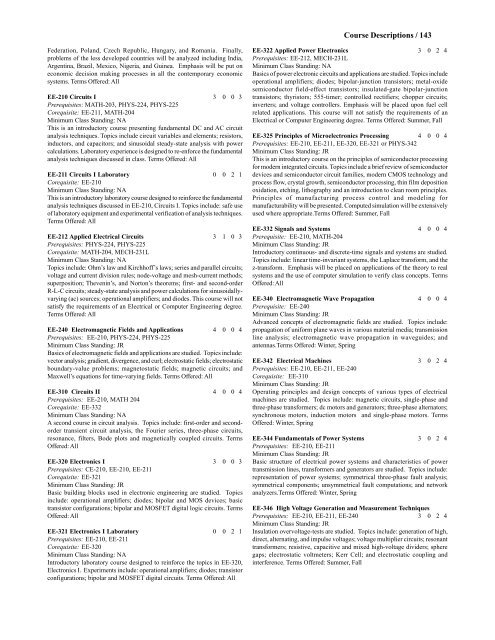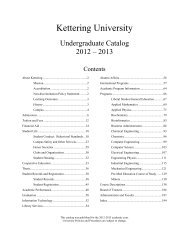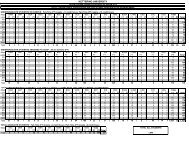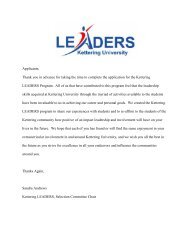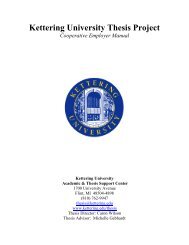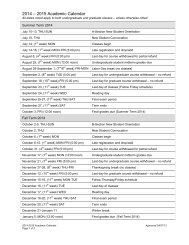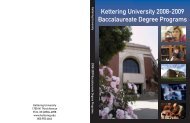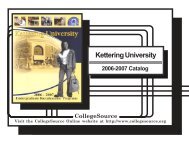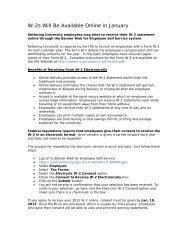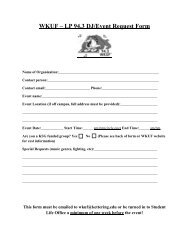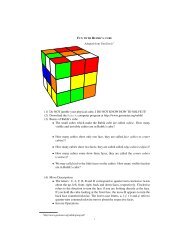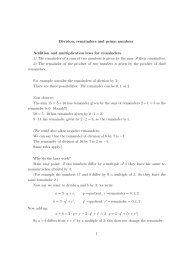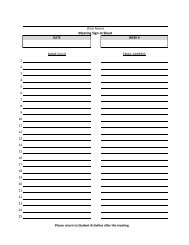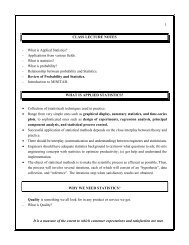2007-2008 Undergraduate Catalog - Kettering University
2007-2008 Undergraduate Catalog - Kettering University
2007-2008 Undergraduate Catalog - Kettering University
Create successful ePaper yourself
Turn your PDF publications into a flip-book with our unique Google optimized e-Paper software.
Course Descriptions / 143<br />
Federation, Poland, Czech Republic, Hungary, and Romania. Finally,<br />
problems of the less developed countries will be analyzed including India,<br />
Argentina, Brazil, Mexico, Nigeria, and Guinea. Emphasis will be put on<br />
economic decision making processes in all the contemporary economic<br />
systems. Terms Offered: All<br />
EE-210 Circuits I 3 0 0 3<br />
Prerequisites: MATH-203, PHYS-224, PHYS-225<br />
Corequisite: EE-211, MATH-204<br />
Minimum Class Standing: NA<br />
This is an introductory course presenting fundamental DC and AC circuit<br />
analysis techniques. Topics include circuit variables and elements; resistors,<br />
inductors, and capacitors; and sinusoidal steady-state analysis with power<br />
calculations. Laboratory experience is designed to re-enforce the fundamental<br />
analysis techniques discussed in class. Terms Offered: All<br />
EE-211 Circuits I Laboratory 0 0 2 1<br />
Corequisite: EE-210<br />
Minimum Class Standing: NA<br />
This is an introductory laboratory course designed to reinforce the fundamental<br />
analysis techniques discussed in EE-210, Circuits I. Topics include: safe use<br />
of laboratory equipment and experimental verification of analysis techniques.<br />
Terms Offered: All<br />
EE-212 Applied Electrical Circuits 3 1 0 3<br />
Prerequisites: PHYS-224, PHYS-225<br />
Corequisite: MATH-204, MECH-231L<br />
Minimum Class Standing: NA<br />
Topics include: Ohm’s law and Kirchhoff’s laws; series and parallel circuits;<br />
voltage and current division rules; node-voltage and mesh-current methods;<br />
superposition; Thevenin’s, and Norton’s theorems; first- and second-order<br />
R-L-C circuits; steady-state analysis and power calculations for sinusoidallyvarying<br />
(ac) sources; operational amplifiers; and diodes. This course will not<br />
satisfy the requirements of an Electrical or Computer Engineering degree.<br />
Terms Offered: All<br />
EE-240 Electromagnetic Fields and Applications 4 0 0 4<br />
Prerequisites: EE-210, PHYS-224, PHYS-225<br />
Minimum Class Standing: JR<br />
Basics of electromagnetic fields and applications are studied. Topics include:<br />
vector analysis; gradient, divergence, and curl; electrostatic fields; electrostatic<br />
boundary-value problems; magnetostatic fields; magnetic circuits; and<br />
Maxwell’s equations for time-varying fields. Terms Offered: All<br />
EE-310 Circuits II 4 0 0 4<br />
Prerequisites: EE-210, MATH 204<br />
Corequisite: EE-332<br />
Minimum Class Standing: NA<br />
A second course in circuit analysis. Topics include: first-order and secondorder<br />
transient circuit analysis, the Fourier series, three-phase circuits,<br />
resonance, filters, Bode plots and magnetically coupled circuits. Terms<br />
Offered: All<br />
EE-320 Electronics I 3 0 0 3<br />
Prerequisites: CE-210, EE-210, EE-211<br />
Corequisite: EE-321<br />
Minimum Class Standing: JR<br />
Basic building blocks used in electronic engineering are studied. Topics<br />
include: operational amplifiers; diodes; bipolar and MOS devices; basic<br />
transistor configurations; bipolar and MOSFET digital logic circuits. Terms<br />
Offered: All<br />
EE-321 Electronics I Laboratory 0 0 2 1<br />
Prerequisites: EE-210, EE-211<br />
Corequisite: EE-320<br />
Minimum Class Standing: NA<br />
Introductory laboratory course designed to reinforce the topics in EE-320,<br />
Electronics I. Experiments include: operational amplifiers; diodes; transistor<br />
configurations; bipolar and MOSFET digital circuits. Terms Offered: All<br />
EE-322 Applied Power Electronics 3 0 2 4<br />
Prerequisites: EE-212, MECH-231L<br />
Minimum Class Standing: NA<br />
Basics of power electronic circuits and applications are studied. Topics include<br />
operational amplifiers; diodes; bipolar-junction transistors; metal-oxide<br />
semiconductor field-effect transistors; insulated-gate bipolar-junction<br />
transistors; thyristors; 555-timer; controlled rectifiers; chopper circuits;<br />
inverters; and voltage controllers. Emphasis will be placed upon fuel cell<br />
related applications. This course will not satisfy the requirements of an<br />
Electrical or Computer Engineering degree. Terms Offered: Summer, Fall<br />
EE-325 Principles of Microelectronics Processing 4 0 0 4<br />
Prerequisites: EE-210, EE-211, EE-320, EE-321 or PHYS-342<br />
Minimum Class Standing: JR<br />
This is an introductory course on the principles of semiconductor processing<br />
for modern integrated circuits. Topics include a brief review of semiconductor<br />
devices and semiconductor circuit families, modern CMOS technology and<br />
process flow, crystal growth, semiconductor processing, thin film deposition<br />
oxidation, etching, lithography and an introduction to clean room principles.<br />
Principles of manufacturing process control and modeling for<br />
manufacturability will be presented. Computed simulation will be extensively<br />
used where appropriate.Terms Offered: Summer, Fall<br />
EE-332 Signals and Systems 4 0 0 4<br />
Prerequisite: EE-210, MATH-204<br />
Minimum Class Standing: JR<br />
Introductory continuous- and discrete-time signals and systems are studied.<br />
Topics include: linear time-invariant systems, the Laplace transform, and the<br />
z-transform. Emphasis will be placed on applications of the theory to real<br />
systems and the use of computer simulation to verify class concepts. Terms<br />
Offered: All<br />
EE-340 Electromagnetic Wave Propagation 4 0 0 4<br />
Prerequisite: EE-240<br />
Minimum Class Standing: JR<br />
Advanced concepts of electromagnetic fields are studied. Topics include:<br />
propagation of uniform plane waves in various material media; transmission<br />
line analysis; electromagnetic wave propagation in waveguides; and<br />
antennas.Terms Offered: Winter, Spring<br />
EE-342 Electrical Machines 3 0 2 4<br />
Prerequisites: EE-210, EE-211, EE-240<br />
Corequisite: EE-310<br />
Minimum Class Standing: JR<br />
Operating principles and design concepts of various types of electrical<br />
machines are studied. Topics include: magnetic circuits, single-phase and<br />
three-phase transformers; dc motors and generators; three-phase alternators;<br />
synchronous motors, induction motors and single-phase motors. Terms<br />
Offered: Winter, Spring<br />
EE-344 Fundamentals of Power Systems 3 0 2 4<br />
Prerequisites: EE-210, EE-211<br />
Minimum Class Standing: JR<br />
Basic structure of electrical power systems and characteristics of power<br />
transmission lines, transformers and generators are studied. Topics include:<br />
representation of power systems; symmetrical three-phase fault analysis;<br />
symmetrical components; unsymmetrical fault computations; and network<br />
analyzers.Terms Offered: Winter, Spring<br />
EE-346 High Voltage Generation and Measurement Techniques<br />
Prerequisites: EE-210, EE-211, EE-240 3 0 2 4<br />
Minimum Class Standing: JR<br />
Insulation overvoltage-tests are studied. Topics include: generation of high,<br />
direct, alternating, and impulse voltages; voltage multiplier circuits; resonant<br />
transformers; resistive, capacitive and mixed high-voltage dividers; sphere<br />
gaps; electrostatic voltmeters; Kerr Cell; and electrostatic coupling and<br />
interference. Terms Offered: Summer, Fall


